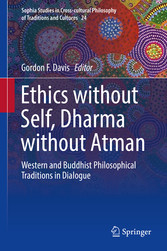Suchen und Finden
Service

Ethics without Self, Dharma without Atman - Western and Buddhist Philosophical Traditions in Dialogue
Gordon F. Davis
Verlag Springer-Verlag, 2018
ISBN 9783319674070 , 284 Seiten
Format PDF
Kopierschutz Wasserzeichen
Geräte
Mehr zum Inhalt

Ethics without Self, Dharma without Atman - Western and Buddhist Philosophical Traditions in Dialogue
This volume of essays offers direct comparisons of historic Western and Buddhist perspectives on ethics and metaphysics, tracing parallels and contrasts all the way from Plato to the Stoics, Spinoza to Hume, and Schopenhauer through to contemporary ethicists such as Arne Naess, Charles Taylor and Derek Parfit. It compares and contrasts each Western philosopher with a particular strand in the Buddhist tradition, in some chapters represented by individual writers such as Nagarjuna, Vasubandhu, Santideva or Tsong Khapa. It does so in light of both analytic concerns and themes from the existentialist and phenomenological traditions, and often in an ecumenical spirit that bridges both analytic and continentalist approaches.
Some of the deepest questions in ethics, dealing with the scope of agency, value-laden notions of personhood and the nature of value in general, are intertwined with questions in metaphysics. One set of questions addresses how varying conceptions of selfhood relate to moral values (e.g. the concern of self or selves for the well-being of others); another set of questions addresses how a conception of oneself or one's selves should or should not affect how one thinks of happiness, or eudaimonia, or - in classical Indian terms - artha, sukha or nirvana. Western philosophy has featured discussion of both, but some would argue that certain traditions of Asian philosophy have offered a more sustained and even treatment of both sets of questions. The Buddhist tradition in particular has not only featured much discussion on both fronts, but has attracted many contemporary philosophers to its distinctive spectrum of approaches, and to what is - from many 'Western' points of view - a seemingly subversive analysis of ego, selfhood and personhood, whether in metaphysical, phenomenological or other incarnations.
Associate Professor and former Chair of Philosophy Dept. (Carleton U.) B.Phil. and D.Phil. in Philosophy, University of Oxford (D.Phil. 2005) Founding executive member of Ethics and Public Affairs doctoral program (Carleton University, Ottawa, Canada) Research interests: Ethical theory, Comparative Philosophy, Buddhist Philosophy, Buddhist Ethics, Metaethics, Political Philosophy, History of Philosophy, Personal Identity, Early Modern Metaphysics Author of 'Traces of Consequentialism and Non-Consequentialism in Bodhisattva Ethics' (Philosophy East & West 2013); 'Moral Realism and Anti-Realism outside the West' (Comparative Philosophy 2013)
Shop

